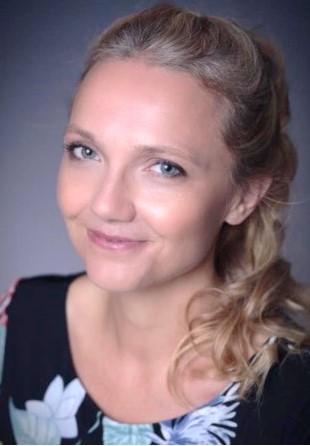Miroslawska disputerer for ph.d.-graden i helsevitenskap og vil offentlig forsvare avhandlingen:
“Renal sympathetic denervation, potential effects on blood pressure and glucose metabolism in patients with severe treatment resistant hypertension. The Re-Shape CV-risk study»

Avhandlingen er tilgjengelig her! / The doctoral thesis is available here!
Disputasen og prøveforelesningen blir strømmet. Opptaket av disputasen vil være tilgjengelig i et døgn.
The defense and the trial lecture will be streamed. A recording of the disputation will be available for 24 hours.
Prøveforelesning over oppgitt emne starter kl. 10.15 / The trial lecture starts at 10.15
Tittel/Title: "A rational approach to the treatment-resistant hypertensive patient”
Prøveforelesningen strømmes her / The trial lecture will be streamed here
Disputasen starter kl. 12.15 / The defense starts at 12.15
Disputasen strømmes her / The defense will be streamed here
De som ønsker å opponere ex auditorio kan sende e-post til leder av disputasen.
Opponents ex auditorio should sign up to leader of defense by e-mail to:
ruth.h.paulssen@uit.no
Populærvitenskapelig sammendrag av avhandlingen/ Summary of the thesis
In the western world, about 30-40% of adults suffer from too high blood pressure (hypertension). In 1945, when President Roosevelt died of stroke, there were not many pills to treat hypertension and surgeons sometimes had to cut the nerves around the kidneys to lower the blood pressure. Although this treatment was performed in more than 1200 cases in the United States until 1953, it was discontinued due to severe surgical complications and the development of medicines that could lower blood pressure. Currently 10 % of hypertensive patients cannot achieve optimal blood pressure, and have a high risk of stroke or a heart attack, even when taking all the prescribed drugs. For these patients a new and mini-invasive method called renal denervation has been developed in an attempt to turn off the nervous signals sent from the kidneys to the brain, signals that would normally increase blood pressure. These signals run through nerve fibers located in the adventitia (outer layer) of the renal arteries. A thin electric ablation catheter that applies energy (heat) to the vessel wall has been constructed to achieve denervation. With this method, the kidney nerves can be destroyed from inside of the renal vessel, without the need for surgery.
More than 50% of all patients suffering from hypertension are considered to have some degree of insulin resistance (also known as prediabetes). Insulin resistance is a condition during which body cells do not recognize insulin as a key that helps glucose (blood sugar) to enter the cells. This leads to too high glucose concentration in the blood and overproduction of insulin, which subsequently contributes to the increase of blood pressure and development of type 2 diabetes. Some of the previous studies have suggested that renal denervation may end this vicious circle and reduce both high blood pressure and insulin resistance. To confirm these findings a renal denervation study has been conducted at UiT the Arctic University of Norway, selecting only nondiabetic patients who, despite using four or more antihypertensive pills every day, had a very high blood pressure. Because previous studies have shown that many hypertensive patients do not take their medicines as prescribed, in this study adherence to prescribed drugs were controlled and nonadherent patients were excluded. The effects of renal denervation on glucose metabolism and blood pressure were examined at 6 and 24 months after the procedure.
Why is this study important?
Previous studies elicited huge enthusiasm, claiming that renal denervation could reduce blood pressure and prevent diabetes, but only simplified methods to assess insulin resistance were used. That is why it was important to seek to confirm these findings using the “gold standard method” called glucose clamp. Glucose clamp is a specialized 6-hour examination, during which every patient gets injected insulin and glucose at the same time and blood samples are taken every 5 minutes to keep blood sugar at a normal level. In this way, one can exactly assess how the tissue responds to insulin. In addition, blood pressure was measured before and after renal denervation.
What have we found?
The results of our study revealed that already before renal denervation, most of our nondiabetic patients suffered from severe insulin resistance. We found that renal denervation did not reduce insulin resistance, neither after short term nor after long term follow-up.
However, we observed a significant decrease in blood pressure after 6 months in about 50 % of patients, presumably due to renal denervation. There are still unresolved questions, who responds to renal denervation and what is the duration of the effect? We controlled blood pressure 2 years after renal denervation and observed that some of the patients kept the blood pressure reduction, but others did not.
Conclusion: This study could not confirm the previously reported amelioration of insulin resistance after renal denervation when assessed by the “gold standard” method.
Veiledere/ Supervisors:
Hovedveileder/Main supervisor:
Førsteamanuensis Terje Steigen, Institutt for klinisk medisin, Det helsevitenskapelige fakultet, UiT Norges arktiske universitet.
Biveiledere/supervisors:
Professor Marit Dahl Solbu, Institutt for klinisk medisin, Det helsevitenskapelige fakultet, UiT Norges arktiske universitet.
Førsteamanuensis Petter Fosse Gjessing, Institutt for klinisk medisin, Det helsevitenskapelige fakultet, UiT Norges arktiske universitet.
Bedømmelseskomité/Defensecomitee:
Dr. Med Kent Lodberg Christensen, Aarhus Universitetshospital – 1. opponent.
Førsteamanuensis Aud Høieggen, UiO – 2. opponent.
Professor Eyvind Paulssen, Institutt for klinisk medisin, Det helsevitenskapelige fakultet, UiT Norges arktiske universitet – leder av komité.
Disputasleder/ Leader of defense:
Professor Ruth H Paulssen, Institutt for klinisk medisin, Det helsevitenskapelige fakultet, UiT Norges arktiske universitet.